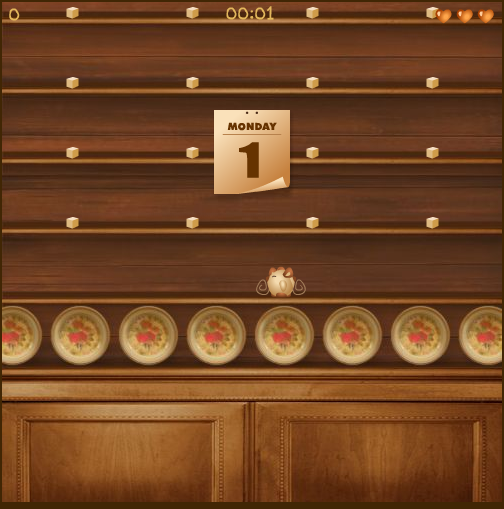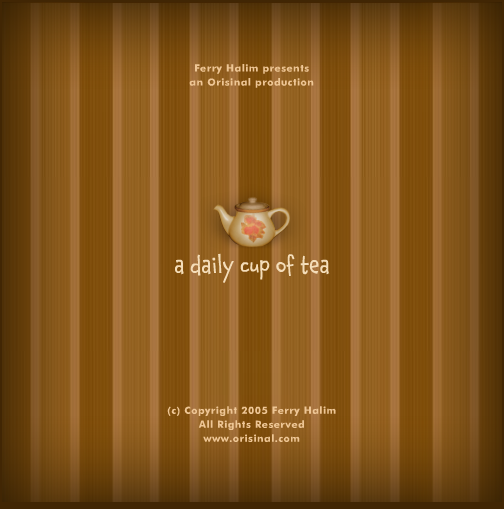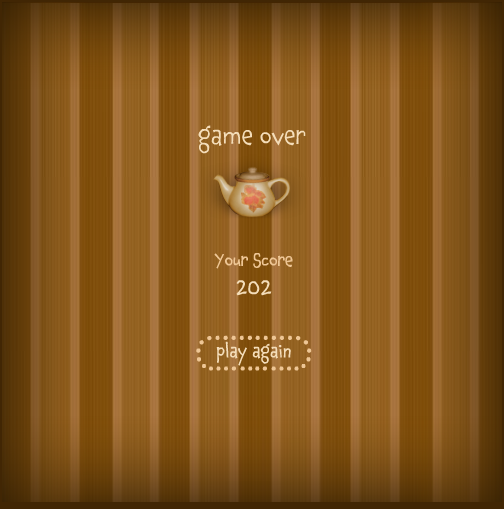Retro Replay Review
Gameplay
A Daily Cup of Tea delivers a deceptively simple yet highly engaging mechanic: guide two resourceful mice through a multi‐tiered cupboard to collect sugar cubes for their beloved tea. Players control both mice simultaneously by moving left or right, clicking on shelves to make one mouse jump up, and clicking again to bring the second mouse along. This cooperative control system feels intuitive once you get the hang of it but introduces satisfying depth as you juggle positioning and timing to maximize point gains.
(HEY YOU!! We hope you enjoy! We try not to run ads. So basically, this is a very expensive hobby running this site. Please consider joining us for updates, forums, and more. Network w/ us to make some cash or friends while retro gaming, and you can win some free retro games for posting. Okay, carry on 👍)
The core loop revolves around knocking sugar cubes off high shelves so that one mouse can catch them before they hit the ground. This catch-and-collect gameplay rewards precision; dropping cubes grants zero points, while perfect catches build combos that unlock bonus stages. Meanwhile, hazards such as bouncing balls and falling books are constantly in play, forcing you to adapt on the fly. Lose a life by getting hit, and you’ll quickly find yourself racing against limited chances to complete each level.
Levels ramp up in complexity, introducing moving platforms, disappearing shelves, and new enemy types to keep the challenge fresh. Late‐game stages test your mastery of pacing, split‐second decision‐making, and foresight. Whether you prefer a methodical approach—lining up perfect jumps—or a more chaotic style—quickly clearing cubes in frenzied runs—A Daily Cup of Tea offers satisfying variety that will keep you coming back for another “sip.”
Graphics
The visual style of A Daily Cup of Tea is charming and whimsical, with hand‐drawn backgrounds that evoke the cozy interior of a vintage kitchen cupboard. Each shelf is detailed with trinkets and teaware, giving levels a lived‐in feel. The color palette leans into warm pastels—soft yellows, gentle browns, and leafy greens—reinforcing the game’s comforting tea theme and making every stage feel like a storybook illustration.
Character animations are smooth and expressive: the two mice dart across planks with delightful little hops and tail flicks, while sugar cubes tinkle convincingly as they tumble. Hazards such as bouncing balls have satisfying squash‐and‐stretch physics, and falling books send small dust puffs into the air. Combined, these effects create a lively world that feels responsive to your every action.
Transitions between levels are handled with subtle fades and animated tea pours, maintaining immersion without interrupting flow. Sound design complements the visuals with light percussion when cubes drop, gentle squeaks from the mice, and occasional clinks of porcelain. Though not groundbreaking, this presentation is polished and cohesive—perfectly suited to the game’s quaint, tea‐centric premise.
Story
At its heart, A Daily Cup of Tea has a simple yet endearing narrative: two tea‐obsessed mice embark on a quest to gather enough sugar for their afternoon brew. While there’s no extensive cutscene drama, a series of charming vignettes between worlds reveal the mice’s personalities and deepen the tea lore. From dreaming of distant Ceylon plantations to debating the merits of Taiwanese oolong, these short interludes add flavor without overstaying their welcome.
The narrative progression aligns with gameplay milestones: basic cupboard levels represent early morning preparation, while more elaborate environments—like a pantry full of exotic spices—symbolize the mice’s growing ambition. Hazards serve as narrative obstacles: a mischievous pantry cat might knock books from a high shelf, or a rambunctious squirrel could unleash bouncing balls. This light storytelling approach keeps the focus on gameplay but still gives players a sense of purpose and progression.
Though the story is minimalistic, it succeeds in giving context to the sugar‐cube hunts. The mice’s dialogue—rendered as playful speech bubbles—injects humor, and the recurring tea motif brings cohesion. For players who appreciate a hint of narrative motivation without lengthy exposition, A Daily Cup of Tea strikes a nice balance between charm and brevity.
Overall Experience
A Daily Cup of Tea offers a delightful blend of precision platforming and lighthearted charm. The core mechanic of dual‐mouse control feels fresh in a genre often dominated by single‐character movement. Hazards and level variety keep the gameplay engaging from start to finish, while the scoring system encourages replayability as you chase high‐combo runs and hidden bonus stages.
Casual gamers will appreciate the accessible controls and forgiving checkpoint system, while veteran players can dig deep into timing challenges and perfect‐cube combos. The game’s pacing is well‐calibrated: early levels function as tutorials, middle stages introduce fresh twists, and later challenges demand honed skills without ever feeling unfair. Repeat playthroughs can uncover secret shelves and alternative routes for extra sugar cubes, extending the game’s lifespan.
Overall, A Daily Cup of Tea is a charming, approachable platformer with enough depth to satisfy completionists and speedrunners alike. Its combination of whimsical aesthetics, intuitive dual‐character mechanics, and tea‐themed storytelling makes it a standout indie offering. Whether you’re a fan of puzzle‐platformers or simply looking for a cozy gaming experience, this title promises many sweet moments worth savoring.
 Retro Replay Retro Replay gaming reviews, news, emulation, geek stuff and more!
Retro Replay Retro Replay gaming reviews, news, emulation, geek stuff and more!








Reviews
There are no reviews yet.